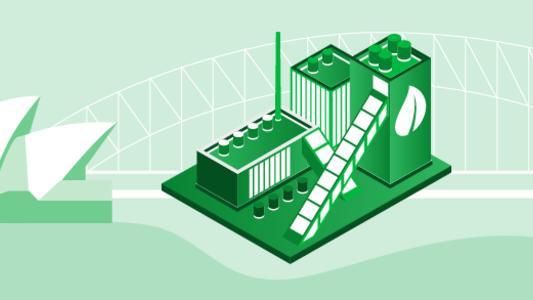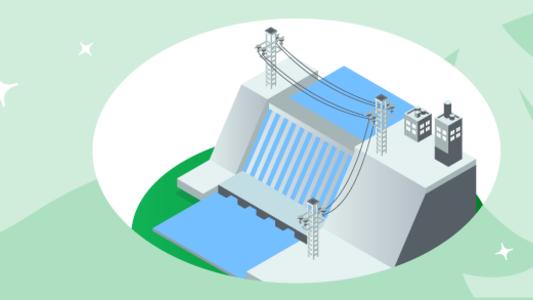Solar Pool Heater Systems: Cost, Installation, Pros & Cons
Did you know you can heat your pool for free with solar energy? A solar pool heater allows you to trap the sun's energy to heat your swimming pool for use year-round. In this guide will explain what you need to know about buying a pool heater, including how they work, their cost, and installation. Read on for this and more.
What is A Solar Pool Heater?
A solar pool heater works by using black tubes called solar collectors to trap the sun’s heat. Water is pumped through the heated tubes where it warms up and is pumped back into the pool.
For particularly hot climates, the solar collectors can also be used at night to cool the pool as well.
There are several parts to a solar pool heater, including:
- A filter
- A pump
- A flow control value
Water is pumped through the filter before being sent through the solar collector to ensure nothing clogs the system.
A pump circulates the water through the solar collectors attached to the roof of your house.
Your solar pool heater may also include a flow control valve. A flow control valve measures the temperature of the water collected and if the pool water is similar to the temperature of the solar collectors, the water will simply bypass the heating element and be sent back into the pool after getting filtered.
Do Solar Pool Heaters Work?
Solar pool heaters do work and can generally extend your pool season by double the normal amount for where you live.
On average a solar pool heater can raise the temperature of your pool between 5 - 18 degrees centigrade. If your pool has a pool bubble, dark pool walls, and are out of the wind, this number can increase to 11- 14 degrees.
As with any solar device, a solar pool heater’s effectiveness depends on a number of factors such as:
- Where you live
- How much sun your roof gets
- The size of your pool
- The weather
Where you live affects the performance of your solar pool heater because of the climate, outside temperature and how much sun your solar pool heater will get.
How much your roof gets is a separate factor, as you may live in a sunny area but have tree coverage or a roof pitch that is less suited for solar pool heating.
The size of your pool is another factor, as solar collector panels typically need to be at least 50% of the area of your pool's surface and could need up to 100%. Bigger pools will require more heating panels.
Lastly, the weather is an obvious factor that affects how quickly your pool will be heated. Less sun means less heating capacity.
Looking for a Solar Quote or the cheapest Solar Panel Installation?
Click now or call our providers to find the cheapest deal for your needs!
How Long Will it Take to Heat My Pool?
In general, it could take up to two weeks to heat your pool to 28 degrees Celsius but this is a broad range.
In Brisbane, your pool could be heated as quickly as within 3 days. In Melbourne, your pool could take over a week to be heated.
However, there are some things you can do to make your pool heat faster.
Factors you can influence to heat your pool faster include:
- Adding Insulation and pool covers: Proper pool insulation, like a pool bubble or a pool cover, can retain at least 75% of its heat
- Your Roof construction material and color: Dark colored roofs and roofs made of metal will heat more efficiently than tile or slate
- The Size of your solar collector: Solar collector area should be at least 80%, ideally 100%, of the size of your pool area
- The direction the solar collectors are facing: Ideally, collectors should face north but 45º east or west will not have a significant impact on heating

Anker Solix offers reliable solar panels, along with batteries and generators to keep your home powered on or off the grid. Their scalable battery systems and portable solar generators make it easy to capture and store solar energy for everyday use or backup needs.
How Much Does a Solar Pool Heater Cost?
A solar pool heater typically costs between $2,500 to $4,000 which includes purchase, parts, and installation.
However, prices differ between glazed and unglazed solar collectors. Although Solar pool heaters require a large up-front investment, the system should last between 10 - 20 years and typically pays for itself within 1-7 years. The payback period depended on the system, running costs, size of your pool and sunlight.
Solar pool heating systems typically last longer than gas and heat pump pool heaters. Your actual cost and payback depend on many factors.
Types of Solar Pool Heating Systems
There are 2 types of solar pool heating systems:
- Glazed solar collectors
- Unglazed solar collectors
Unglazed solar collectors: Unglazed collectors are generally made of a heavy-duty rubber or plastic material, treated with an ultraviolet light inhibitor. Since they’re unglazed, meaning they don’t include a glass covering, they are less expensive and less efficient than glazed solar collectors. If you’re only using your pool when temperatures are above freezing, unglazed solar collectors are a valid and cost-effective option.
Glazed solar collectors: Glazed collectors are made of aluminum plate and copper pipes covered with a glass coating. Glazed systems are more expensive, but also capture solar heat more efficiently than unglazed systems. This means they are suitable for year-round use in colder climates. In dry climates, glazed panels will need consistent cleaning if there is no rainfall to eliminate dust.
Solar Pool Heater Efficiency Rating
Like other home appliances, such as solar home water heaters, your solar pool heater will come with efficiency ratings and standards set forth by the Clean Energy Council in line with reaching Australia's renewable energy target.
High-efficiency solar collectors might be more expensive up front, but will often reduce your running costs and take up less space in order to heat your pool.
Solar pool heaters are rated on the solar collector's thermal performance rating, which is measured in British thermal units (Btu) per square foot per day or megajoules (MJ) per square meter per day.
The higher the number, the higher the efficiency of the system. It is important to note that the efficiency of two solar collectors can be considered roughly the same if the ratings are within 25Btu per square foot per day of each other.
Depending on the efficiency and output of your solar panels, you may also be able to apply for a solar feed-in tariff.
How Long Does a Solar Pool Heater Last?A new solar pool heater should last for between 10-20 years. Traditional electric and gas pool heating systems have a lifespan of 5-10 years.
Pros & Cons of Solar Pool Heating Systems
While a solar pool heater has many advantages as a green energy source, including lower energy consumption and cost, it isn’t for everyone.
The upfront cost of a solar pool heater can be a lot more than traditional pool heating systems, and not every home is suitable for solar collectors. If the roof isn’t the right pitch or position, or there is a lot of shade from trees or buildings, solar pool heating might not be possible.
In addition, if you don’t live somewhere that gets lots of sun, your pool might not get as warm as with a traditional pool heater.
| Pros of a solar pool heater | Cons of a solar pool heater |
|---|---|
|
|
Installing a Solar Pool Heater
It's best to find an accredited solar installer that specializes in solar pool heating.
Apart from ensuring that your system is installed correctly and is compatible with your current pool system, you will need an accredited installer to be able to apply for grants and rebates.
Here are some important questions you may want to ask your solar installer before purchasing a solar pool heater from them:
- Do you gave experience installing solar pool heating?
- How long have you been installing solar pool heaters?
- Are you certified with the Clean Energy Council?
- Are you familiar with local building codes and regulations?
Next, you will want to ask the retailer to provide a site analysis to determine the following information:
- How much sun your rooftop gets (also known as your home’s solar resource)
- The correct system size needed to efficiently heat your pool
- The best position, orientation, and tilt for the collector
- Different types of systems and their costs
- Local regulation regarding solar energy systems
It's a good idea to get several quotes from different installers as each company may offer slightly different customizations and options which may help you in the long run.
Looking for a Solar Quote or the cheapest Solar Panel Installation?
Click now or call our providers to find the cheapest deal for your needs!
Is a Solar Pool Heater Right for Me?
Even if you live in a climate that doesn't get tons of sun for the majority of the year, you could still benefit from a solar pool heater.
That's because solar pool heaters function with direct and indirect sunlight. As long as your roof isn't covered by shade, and is generally southward facing, your home could be suitable for solar pool heating. Ask a local installer to check for you.
If you are considering purchasing a regular pool heater, a solar pool heater might be better for you as well given its extended lifetime and low running costs. However, if you plan on using your pool heater at specific times of the year and need your pool heated quickly, then a solar pool heater probably isn't right for you as it takes longer to heat the pool.
Did You Like This Article? Discover more about renewable energy with our articles on biomass, wind, hydro power and green power.
More about Renewable

Green Gas: What Is It and Can You Use It at Home?

Green Energy: What It Is and Why It Matters

Smart Lighting Systems in Australia

Green Loans for Healthcare Providers: Save on Solar, EVs & Energy

Biomass Energy and Biogas in Australia

Hydroelectricity & Hydropower in Australia

Wind Energy, Wind Turbines, and Wind Power in Australia
Frequently Asked Questions
What is a solar pool heater and how does it work?
A solar pool heater uses black tubes called solar collectors to trap the sun's heat. Water is pumped through these tubes where it warms up before returning to the pool.
Do solar pool heaters really work?
Yes, they can extend your swimming season by raising pool temperatures between 5 to 18 degrees Celsius, depending on climate, pool size, and sunlight exposure.
How long does it take to heat a pool with solar?
Heating times vary by location and weather. Brisbane pools can heat in 3 days, Melbourne in over a week. Using pool covers and good insulation helps speed up heating.
What is the cost of installing a solar pool heater?
Costs typically range from $2,500 to $4,000 including purchase and installation, varying based on pool size, system type, and components used.
What types of solar pool heating systems are available?
There are glazed and unglazed collectors. Unglazed are less expensive and efficient, suitable for warmer climates, while glazed collectors are better for colder regions and year-round use.
How long do solar pool heaters last?
Solar pool heaters typically last between 10 to 20 years, generally longer than gas or electric pool heaters.
Click below to find a better deal for your home!

